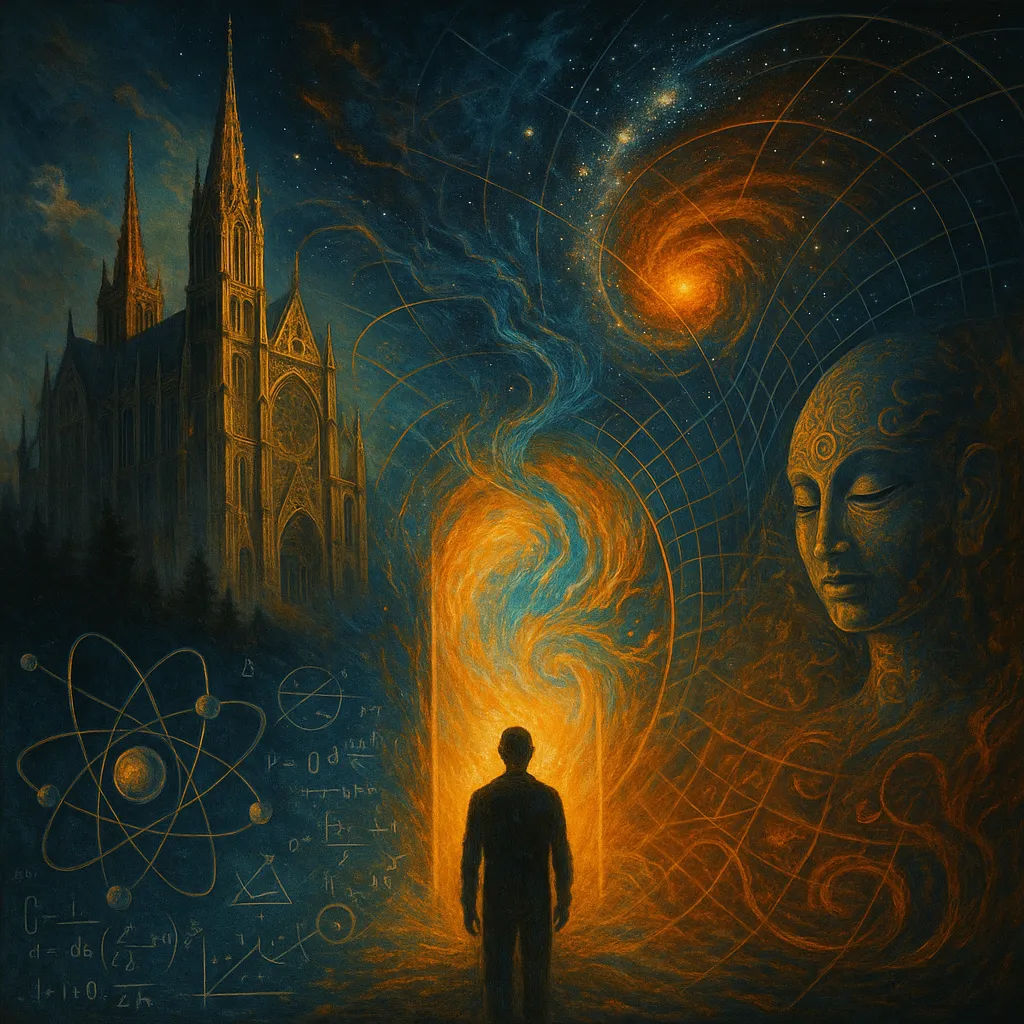
The Shared Instinct Between Science & Spirituality
We can't deny the appeal, yet there is a thorn in its side.
The mix of science ideas (like Quantum) with new age metaphysics has become a popular terrain in personal development. Yet these are fundamentally different domains, as much as methodologically as philosophically and culturally.
So what is that inclination that drive's us to combine them? And what principles shall we have in mind if we want to do it even better?
The influence of beyond
There seems to be a certain deep seated drive in human nature, a pattern present at different layers and across cultures, about seeking the beyond.
Sometimes it shows as external exploration towards new frontiers, like towering cathedrals, particle colliders or even going into space. Other times the frontiers are internal as aspects of deeper explorations of the self and considering what is beyond the appearances of behaviours whether it is with psychology, shamanic journeys, zen or other contemplative traditions.
And sometimes this instinct manifests through symbolic systems. Whether it is the language of mathematics, cosmology, deities, myth and other abstract constructions of human thought. And these systems beyond that describing a certain reality, they also shape how we engage with it.
To witness this instinct we don't need to look far. It's already there, in the curiosity to check that hidden alley, the unknown part of a forest, to daydream, follow a new thought or emotion to its root, read that new author and even in that childish doodle or painting with the strange face.
In western cultures when enlightenment came and with it the secularisation of our view of the world, we didn't stop thinking about the cosmos. Instead our wonder continued in different shape and form. As Foucault insightfully noted, the role of the priest was replaced by the scientist. And with the progress of scientific effort the universe was extended to the multiverse and the Newton's classical mechanics to quantum fields and black holes. The language and the type of thinking changed but the drive remained.
So while science and spirituality follow very different rules, they are both animated by the same instinct. They both answer to the appeal of crossing a threshold of possibilities beyond what has been considered so far.
Blending Them: A Natural Consequence with Risks
So when it comes to a culture where the scientific paradigm is prevalent, where we have science and spirituality generated by the mind's same need, how else is it more natural to attend to this need other than blending and mixing what is already there? How else can we help the mind evolve into new dimensions by crossing horizons other than with a language it already understands for this purpose?
More than that
The symbolic is essentially where the idea of exploration and abstract depiction of universe grabbing ideas meet.
And where else is best to apply that symbolism other than exploring the internal frontiers of the mind itself?
But here lies the thorn!
Depending on whether you more in the science or the mystical side of things you may feel this in a different ways yet you know there is something missing.
Let's be honest.
Sometimes scientific terms get used more for marketing effect than meaning. After all it's easy to throw "quantum" at a transformation like glitter on a vision board. In some cases what is promised is magical fixes which do not honour the process and complexity of certain people transformative journeys. Or other methods reinforce the idea that a deep transformative experience requires the acceptance of a certain dogmas, thus subotagging the self-inquiry they envision to create.
If you lean towards science you may not be evolving in your internal journey because the language doesn't fit your worldview. If you are more spiritual person you may be easing the tension that it's not really quantum in the scientific sense, telling yourself "How do we even know it is not?".
There is also value in activating the imagination. The use of ideas and processes that raise the expectations and lead to faster results is important. At the same time we should respect other people's more difficult journeys. Because the quantum field of possibilities may inspire hope, but it not be enough to reconcile with your shadow.
Walking the Slack-Line
I do believe people we can synthesise meaningfully using elements from many different systems. As long as we carefully examine our own biases, question our claims and stay honest about what each lens offers and where it falls short.
The balance required to achieve that is delicate. It's like walking on a slack-line. It takes effort, attention and presence. It's no surprise our first efforts to do so gravitate too far towards either of two directions. Mysticism vs Reductionism and Magical Thinking vs Ivory Tower Intellectuality.
When I watch a science fiction film like Interstellar or Event Horizon, I let the story excite my curiosity and imagination, and yet I don't take it all as a fact. I know it's symbolic fiction with it's own permissions. Permissions necessary to tell the story.
So why should storytelling with metaphysical elements need to be taken as literal truth? Why do we fear that letting go of a dogma undermines the transformational process?
That's a belief worth questioning.
As humans we tend to collapse perspectives into a single framework and examine everything else from that.
But when we want to integrate multiple lenses, like those of science, spirituality and narrative,
we owe it to those who came before us, and those we hope to serve, to do so with integrity. That means honouring the source disciplines and respecting people's journeys and emotional processes.
So what makes a metaphor powerful without being misleading?
That's where I am with my thoughts about that and I am curious about yours. Because I think it's about time we walk this slack-line all the way to the end.
What do you say?





